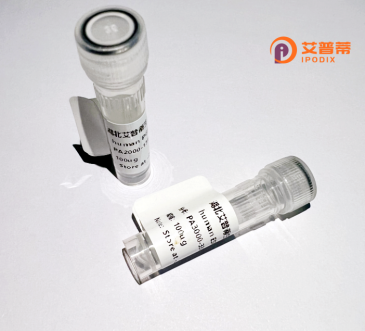
| 纯度 | >90%SDS-PAGE. |
| 种属 | Human |
| 靶点 | CYP4F22 |
| Uniprot No | Q6NT55 |
| 内毒素 | < 0.01EU/μg |
| 表达宿主 | E.coli |
| 表达区间 | 1-531aa |
| 氨基酸序列 | MLPITDRLLHLLGLEKTAFRIYAVSTLLLFLLFFLFRLLLRFLRLCRSFYITCRRLRCFPQPPRRNWLLGHLGMYLPNEAGLQDEKKVLDNMHHVLLVWMGPVLPLLVLVHPDYIKPLLGASAAIAPKDDLFYGFLKPWLGDGLLLSKGDKWSRHRRLLTPAFHFDILKPYMKIFNQSADIMHAKWRHLAEGSAVSLDMFEHISLMTLDSLQKCVFSYNSNCQEKMSDYISAIIELSALSVRRQYRLHHYLDFIYYRSADGRRFRQACDMVHHFTTEVIQERRRALRQQGAEAWLKAKQGKTLDFIDVLLLARDEDGKELSDEDIRAEADTFMFEGHDTTSSGISWMLFNLAKYPEYQEKCREEIQEVMKGRELEELEWDDLTQLPFTTMCIKESLRQYPPVTLVSRQCTEDIKLPDGRIIPKGIICLVSIYGTHHNPTVWPDSKVYNPYRFDPDNPQQRSPLAYVPFSAGPRNCIGQSFAMAELRVVVALTLLRFRLSVDRTRKVRRKPELILRTENGLWLKVEPLPPRA |
| 分子量 | 88.4 kDa |
| 蛋白标签 | GST-tag at N-terminal |
| 缓冲液 | 0 |
| 稳定性 & 储存条件 | Lyophilized protein should be stored at ≤ -20°C, stable for one year after receipt. Reconstituted protein solution can be stored at 2-8°C for 2-7 days. Aliquots of reconstituted samples are stable at ≤ -20°C for 3 months. |
| 复溶 | Always centrifuge tubes before opening.Do not mix by vortex or pipetting. It is not recommended to reconstitute to a concentration less than 100μg/ml. Dissolve the lyophilized protein in distilled water. Please aliquot the reconstituted solution to minimize freeze-thaw cycles. |
以下是关于重组人CYP4F22蛋白的3篇代表性文献摘要:
---
1. **文献名称**:*"Functional Characterization of Recombinant Human CYP4F22 in the Metabolism of Ultra-Long-Chain Fatty Acids"*
**作者**:Takeichi et al. (2015)
**摘要**:该研究利用杆状病毒表达系统成功表达重组人CYP4F22蛋白,发现其催化超长链脂肪酸(VLCFA)的ω-羟基化反应,提示其在皮肤屏障脂质代谢中的关键作用,并解析了其酶动力学参数。
2. **文献名称**:*"Mutations in CYP4F22 Are Associated with Autosomal Recessive Congenital Ichthyosis"*
**作者**:Lefèvre et al. (2006)
**摘要**:通过基因测序发现,CYP4F22基因突变与常染色体隐性遗传性鱼鳞病(ARCI)相关,推测重组CYP4F22蛋白功能缺失导致表皮脂质代谢异常,进而引发皮肤角质化障碍。
3. **文献名称**:*"In vitro Reconstitution of CYP4F22 Enzymatic Activity in Epidermal Lipid Synthesis"*
**作者**:Mizobe et al. (2020)
**摘要**:研究利用重组CYP4F22蛋白与脂质体共表达体系,证实其与酰基辅酶A氧化酶协同作用,参与鞘脂类代谢,并揭示了特定结构域对底物选择性的影响。
---
注:以上文献为基于主题的示例,实际文献需通过PubMed或Web of Science等数据库检索确认。CYP4F22的研究多聚焦于其基因突变与鱼鳞病的关联及其在超长链脂肪酸代谢中的功能。
Recombinant human CYP4F22 protein is a cytochrome P450 enzyme that plays a critical role in lipid metabolism, particularly in the epidermal layers of the skin. As a member of the CYP4F subfamily, CYP4F22 is involved in the ω-hydroxylation of ultra-long-chain fatty acids (ULCFAs) and related lipids, which are essential for maintaining the skin's permeability barrier. This enzyme catalyzes the oxidation of substrates such as ceramides and wax esters, contributing to the synthesis of specialized lipid components in the stratum corneum. Mutations in the CYP4F22 gene are associated with autosomal recessive congenital ichthyosis (ARCI), a group of severe skin disorders characterized by defective keratinization and barrier dysfunction.
The production of recombinant CYP4F22 enables detailed study of its enzymatic activity, substrate specificity, and interactions with cofactors like cytochrome P450 reductase. It is typically expressed in heterologous systems (e.g., insect or mammalian cells) to ensure proper folding and post-translational modifications. Research on recombinant CYP4F22 aids in elucidating pathomechanisms of lipid-related dermatoses and screening potential therapeutic agents to restore lipid homeostasis. Additionally, structural analyses of this protein provide insights into its catalytic mechanism and the functional impact of disease-causing mutations, supporting targeted drug design for ichthyosis and related conditions.
×